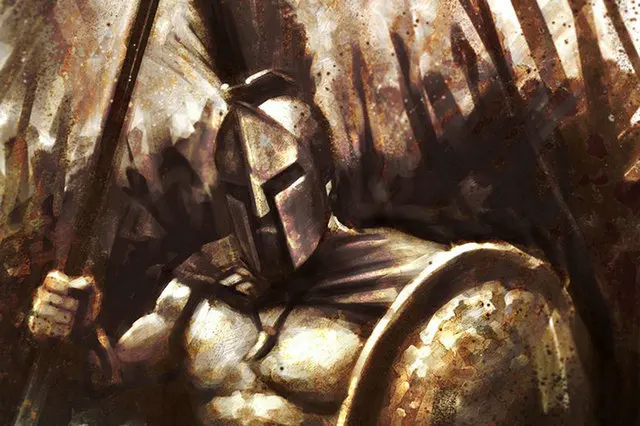History's Warriors: Spartans

For the next week, we're going to take a look at four of history's most famed and fearsome groups of warriors and consider how their lives can teach us to live boundlessly. Today, we look at the Grecian Spartans.
By Greyson Gilbert
Harsh.
That was what defined the Spartan way of life. Because of this harshness
though, the Spartans of Ancient Greece grew into a powerful military society
and one of the first democracies the world had ever seen. Spartan society was centered around a strict doctrine of
discipline, duty, and endurance. Spartans underwent many hardships and
depravations before being accepted as full spartan citizens.
Difficulty abounded in a Spartans life, starting at birth. Infanticide was a disturbingly common practice, as infants with birth defects were often left on a hillside to die or to be picked up and adopted by travelers. At the age of 7, all Spartan boys were put in a state-organized military training and schooling known as the Agoge. The Agoge served to produce the Spartan warrior from every boy in Sparta. In order to become an equal citizen, or "Homoioi," Spartan males had to become life-long warriors. Manufacturing and Agriculture was left to the lower classes of non-citizens in the surrounding area, and farming was done by grecian slaves, called helots.
In the Agoge, boys were not only taught in reading, writing, rhetoric, and poetry, but were placed under a vicious physical training regiment. Fighting and hazing was encouraged, and the men lived in barracks until they were 30. Youths were ritualistically beaten and flogged in order to test the boys bravery and resistance to pain. When they turned 12, trainees were given nothing but a red cloak and forced to sleep outside, on only a handmade bed of reeds. Through constant testing, fighting, and suffering, spartans were taught to resist cold, hunger, and pain while showing no signs of fear or cowardice.
Poor fitness was a cause for ridicule. Young women would actually write and perform songs making fun of trainees that were underperforming in order to encourage them to do better. Proper nutrition and physical condition, often forged through constant fighting and wrestling, was necessary in young Spartan soldiers. At large public meal gatherings, soldiers were often given meager rations and bland food in order to prepare them for the harshness of being out in the field.
Spartans shamed surrender. Spartan warriors were expected to fight to the last man, and without fear, and those who surrendered were often publicly shamed and humiliated. To die in battle was regarded as to complete one's duty to his state and family.
Spartan women were different than anywhere else in Greece. They were given a high level of freedom and education, and instructed on how to live and raise children. In addition to schooling, they trained physically through dance, gymnastics and javelin and discus throwing. Motherhood (essentially rearing Spartan warriors) was the ultimate duty of women, and for it they were highly respected.
Sparta method of forging effective citizens through pain and suffering is something that is all but lost on much of society today. Their moral sense of discipline and duty allowed them to train harder than almost anyone, and succeed in many great endeavors. The following are five famous phrases said by ancient Spartans, and their context:
1. “With it or on it."
This 5 word sentence is a
shortened version of what Spartan mothers would commonly tell their sons
before heading into battle: "Return with your shield or on it." No
holding back.
2. "We are the only ones who give birth to men."
Queen Gorgo was Leonidas's
wife, and ruler of domestic Sparta. The Spartans often equated childbirth with
going into battle, and revered and respected women and the process of
childbirth which they underwent. When Gorgo was asked why only Spartan women
could rule over men, she replied with the above quote.
3. "If."
Around 350 B.C., King
Philip of Macedonia had been busy conquering much of Greece. After setting up a
few strongholds in Greece, he began to threaten Sparta. He sent a message to
the Spartans: "If I win this war, you will
be slaves forever.” The Spartans replied by sending a message of their
own. One simple word: "If." Philip, although he invaded most of
Greece, never touched Sparta.
4. "Neither."
A little while after King
Philip's previous letter to the Spartans, and following an increase in his
newly conquered Grecian territory, he decided to try Sparta again. He sent
a letter asking whether the current Spartan king would rather him enter as a
friend or foe into Spartan territory. The reply was, again, a single
word: "Neither." They were fiercely defensive of their home,
even in the face of Philip's growing empire.
5. "Molon Labe."
Possibly the most well
known Spartan phrase was spoken by King Leonidas in 480 B.C. According to the historical text “Apophthegmata
Laconica," Leonidas's army of Grecians, led by his famous 300 Spartan
warriors, met the Persian King Xerxe's army, which outnumbered his own 200 to
1, at Thermopylae. When Xerxes wrote Leonidas to hand over his weapons, he
responded with "Molon Labe." The phrase roughly translates to
"Come and take them." Leonidas died in the battle at Thermopylae, but
all of Greece continued on together and drove back Xerxe's army.
Plutarch's “Apophthegmata Laconica," in addition to recording the famous sayings of Greek and Spartan men, holds these conversations of Leonidas's pertaining to the Battle at Thermopylae:
"When someone said, 'Leonidas, are you here to take such a hazardous risk with so few men against so many?' he said, 'If you men think that I rely on numbers, then all Greece is not sufficient, for it is but a small fraction of their numbers; but if on men's valour, then this number will do.'...
When someone said, 'Because of the arrows of
the barbarians it is impossible to see the sun,' he said, 'Won't it be nice,
then, if we shall have shade in which to fight them?'...
He bade his soldiers eat their breakfast as if
they were to eat their dinner in the other world."









Comments
Post a Comment